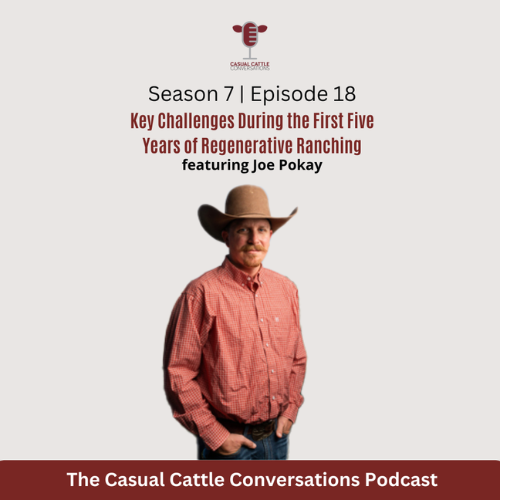The Casual Cattle Conversations Podcast: Key Challenges During the First Five Years of Regenerative Ranching
Thursday, May 2, 2024
Reference: Podcast Corner

Key Challenges During the First Five Years of Regenerative Ranching
April 29, 2024 | Written By Shaye Koester
In between where we are and where we want to be lies the challenges that come with change. However, the difference in those who get to the other side and those who revert back to old ways comes down to practicing patience and maintaining the proper mindset. Joe Pokay, general ranch manager at the Noble Research Institute, shared how to stay patient and adopt the right mindset to make it through the first five years of focusing on regenerative principles during Season 7, Episode 18 of the Casual Cattle Conversations Podcast.

Click Here to listen to Shaye's Podcast
Patience
Patience. Some are better at it than others but there is no way around it, especially when you rely on Mother Nature. It’s important to remember that regenerating the soil and being stewards of the land isn’t about instant gratification. “It’s a long game. The soil changes on a different timeline than our world operates in. We are used to things happening fast and nature doesn’t operate that way,” said Pokay. Yet, there are ways to be instantly gratified through this process. If you choose to be a diligent observer and learn to enjoy the process, you’ll quickly be rewarded in ways you might not expect. “Along with regenerating the soil, I am a big stockmanship advocate. So, when we had these large groups of cattle together it was really enjoyable to see, observe and move the cattle all the time. I could keep good track of everything that was going on in the herd. It was immediate gratification for me each day and the long-term gratification came the next year when the grass looked better,” said Pokay as he recounted his beginning years.Within the long-game strategy, there are little wins and metrics that can be tracked to help keep you motivated and ensure you are moving forward. “Keep track of your little wins and celebrate them,” said Pokay. A little win could look like less days spent feeding this year than previous years, seeing a new plant or wildlife species, a reduced mortality rate in your herd or a number of other things that might be easily overlooked. Additionally, you can take soil tests over the years to track changes that are occurring on a more analytical level. Small changes will start to snowball and become very valuable. “Once you start changing your management practices you will see small incremental, linear changes but after a while the growth becomes exponential,” said Pokay. It all just goes back to having patience and trusting the process.
Mindset
Two key mindset components to adopt are continuous learning and operating in the present world and not the past. Staying curious and recognizing that you always have a lot to learn will help you adapt and make the right changes faster. “Knowing that I don’t know everything fuels me to keep learning,” said Pokay. Different weather patterns, groups of cattle and other factors will continue to create new scenarios for you. Lean into these moments and lean on your network of trusted peers to keep learning.If you find yourself stuck in your mindset because specific practices appear to have worked across generations, make sure to back up that assumption with numbers before deciding whether to change or stay the same. “The old production models were not established during our current economy,” said Pokay. A lot of new technology and research has emerged in the last 50 years and you need to ensure your management practices are setting you up for a profitable business model.
A few final words of advice shared by Joe are to have a set of like-minded peers who can provide feedback, know your numbers, stay focused on soil health and go all in one change at a time. Challenges are inevitable when you decide to make a change but by practicing patience, staying focused and shifting your mind; you can undoubtedly find yourself in a better place by making the decision to the leave the land better than you found it.
Sign up to stay connected
- News
- Property Alerts
- Save your favourite properties
- And more!
Joining Farm Marketer is free, easy and you can opt out at any time.
